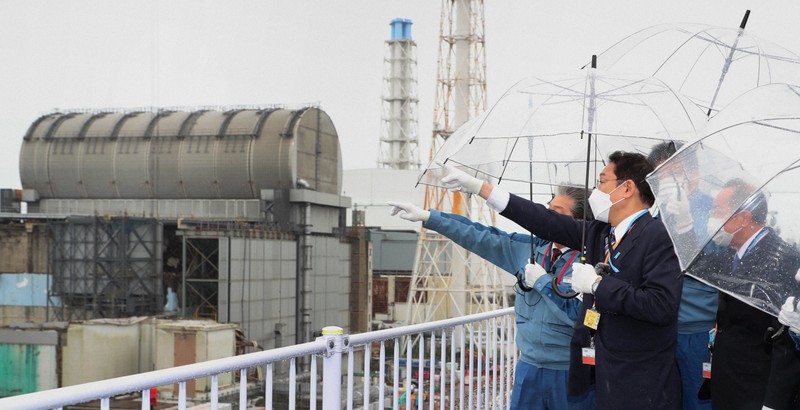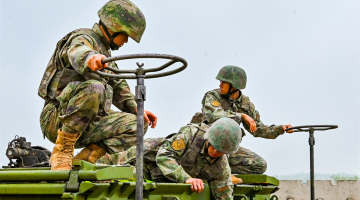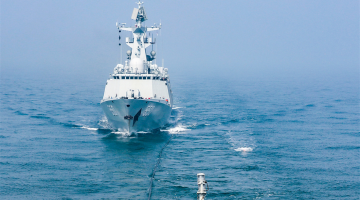
By Chen Yang
Japanese newspaper The Asahi Shimbun reported on October 18 that Japanese Prime Minister Fumio Kishida inspected the Fukushima Daiichi Nuclear Power Plant in Fukushima Prefecture on October 17, and said in an interview that the discharge of contaminated water into the sea shall not be delayed any longer and relevant work shall be kept transparent. Besides, also thisThe new prime minister also, on the very same day, sent the “masakaki” tree offering in his new official capacity to the Yasukuni Shrine on October 17th.
From supporting the discharge of nuclear contaminated wastewater to the sea to paying homage to Yasukuni Shrine, the latest moves by Japan’s new prime minister go contrary to his usual dovish profile and reflect his eagerness to cater to the conservative forces at home at the cost of his own image. But wWith such a sudden change of face, how does the Kishida administration expect to gain trust from its Asian neighbors and the international community? Japan’s new administration is playing with fire and is very likely to get burned itself.
Before being elected as prime minister, Kishida had never sent the “masakaki” offering to Yasukuni Shrine and has kept his distance from Shinzo Abe and other conservative forces within the Liberal Democratic Party on issues such as revision of the constitution, historical issues and the increase of military budget. Yet soon after he took office, he quickly pledged to continue pushing the discharge of contaminated wastewater in Fukushima to the sea and offered the “masakaki” to the shrinethings have changed so fast. Such a mode of action that goes completely contrary to the dovish image he has carefully kept for so long makes people wonder what his real political intention is.
When Yoshihide Suga governement’s announced his decision to discharge the wastewater in Fukushima nuclear sewage into the sea, he had aroused vehement opposition in Japanese society. Asahi Shinbun, a mainstream media outlet in Japan, published a poll in January this year that showed 55% of the respondents opposed this decision.
The offering of “masakaki” by prime ministers to Yasukuni Shrine has also been a target of objection in Japan. Asahi Shinbun has many times criticized Shinzo Abe and Yoshihide Suga for sending offerings to the shrine in the name of the president of LDP and prime minister because “that would make people think Japan has given up reflecting on history and is trying to defend its history of aggression before the war”.
The latest moves by Kishida are obviously an imitation of his two predecessors, but theywhich has betrayed the mainstream public opinions of the Japanese people. A poll published by Kyodo News Agency on October 18 showed that 68.9% of the respondents held that Kishida should not continue down the path left by the Abe and Suga administrations.
The new prime minister has also let down Japan’s neighbors. He has held phone conservations with the leaders of many neighbors recently, including Russia, China, and ROK, expressing his wish to mend the diplomatic relations with them that were strained during Suga’s reign. To everyone’s surprise, the Kishida administration didn’t change its plan for disposing of the radioactive wastewater, but chose to stick with the plan of sea discharge against opposition from all sides.
The presentation of offerings to Yasukuni Shrine only made things worse, which by has makingde it harder for Japan to form a relationship of trust with its neighboring countries. The spokesperson of ROK’s Foreign Ministry said that the ROK government urges the Japanese side to take the formation of the new administration as an opportunity to face up to history and take concrete actions to reflect on history, sincerely and modestly. The Chinese Ministry of Foreign Affairs Spokesperson Zhao Lijian, also said on October 18 that the Chinese side has lodged solemn representation with the Japanese side through the diplomatic channel. The Japanese side should earnestly honor its statement and commitment of facing up to and reflecting on its history of aggression.
Since the LDP was founded in 1955, its Kochi-kai faction has turned out several prime ministers including Hayato Ikeda, Masayoshi Ohira and Kiichi Miyazawa, who during their term contributed to the deepening of Japan’s diplomatic relations with surrounding countries to varying degrees. Historical experience, both on the upside and downside, is worth learning from by Fumio Kishida, the latest prime minister produced by the faction.
Editor’s note: This article is originally published on haiwainet.cn, and is translated from Chinese into English and edited by the China Military Online. The information, ideas or opinions appearing in this article do not necessarily reflect the views of eng.chinamil.com.cn.









